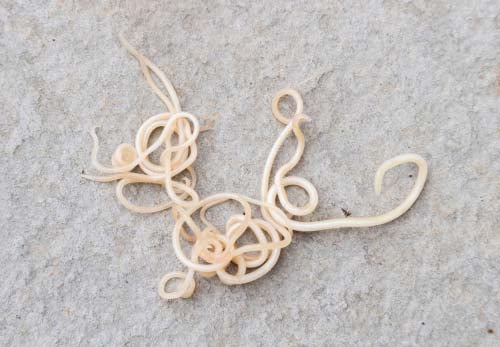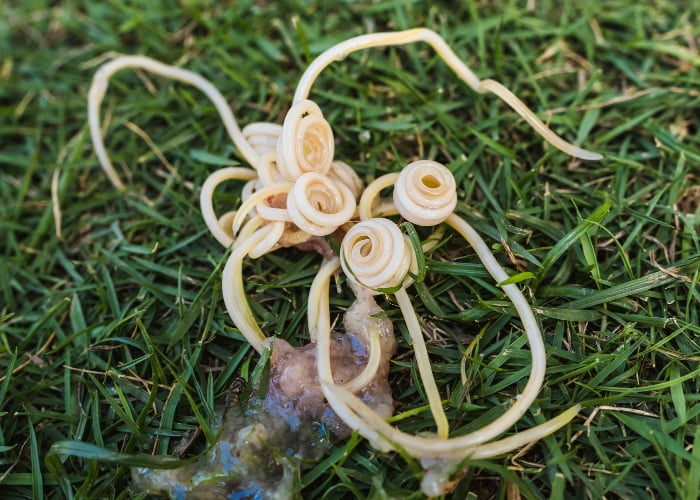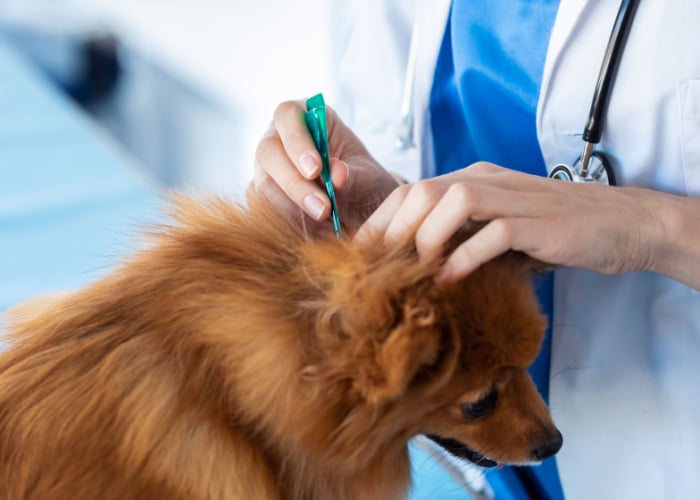
Table of Contents
Dogs can get infected with numerous types of infectious parasites, and one of them is the roundworm.
Roundworms are internal parasites commonly found in dogs—most often in puppyhood.
Roundworms in dogs can significantly impact their health, and in rare cases, they can be lethal.
Moreover, roundworms can also infect and cause illnesses in humans.
As pet owners, we must know about these things to protect our dogs from roundworms and help keep you and your family safe from possible diseases.
This blog will tackle everything you need to know about roundworms in dogs.
Below, we'll discuss these parasites' symptoms, causes, prevention, and how to treat them.
But before that, let's first discuss what roundworms are.

What are Roundworms?
Roundworms, also known as ascarids or nematodes, are common intestinal parasites that live inside your dog’s intestines. How common, you ask?
Well, almost all dogs have roundworms at some point in their lives, but it is most commonly experienced during puppyhood.
Roundworm has two main species that affect dogs: Toxocara canis (T. Canis) and Toxascaris leonina.
Toxocara canis is worse, and humans can get infected with it too. These parasites are typically white or light brown and can grow up to a few inches long.
Life Cycle of Roundworms in Dogs
Let's dive in deeper and explain the roundworm life cycle in dogs.
First, adult roundworms live in the small intestines of infected dogs.
Male and female roundworms mate, and females can produce up to 200,000 eggs per day, which are passed in the feces.
Their eggs passing through the feces are not immediately infectious.
However, they can become infectious after 2 to 3 weeks under the right environmental states and remain infectious for many years.
Can You See Roundworms in Dog Poop?
Even without a microscope, it is possible to see roundworms in a dog's stool or vomit.
However, if you're monitoring your pet's stool and don't see them, that still doesn't mean they are not there.
Roundworms can get as long as up to 7 inches. They basically look like spaghetti.

How Do Dogs Get Roundworms?
So, how do dogs get roundworms?
Well, there are a few ways dogs can acquire roundworms. For instance, it can be from the environment where your pup is.
Below, we've listed three of the common causes of acquiring roundworms in dogs.
From Their Mother
One of the most common, or the most common, modes of roundworm transmission in dogs is through their mother's placenta.
The transmission of roundworms to puppies is usually through the placenta.
When an adult dog swallows eggs, the larvae hatch, move through their intestines, and migrate again to many different body tissues.
Then, the larvae will stop growing and become inactive in cysts until a dog becomes pregnant.
The larvae will start developing during estrus and then migrate to the placenta and into the puppy fetus.
Moreover, larvae can also migrate into the mammary glands, causing puppies to get infected during nursing.
Ingesting Roundworm Eggs
Dogs are naturally curious animals, and they tend to eat things that they shouldn't due to their curiosity.
However, be careful because dogs can also get roundworms by ingesting infective eggs from their surroundings.
For instance, if you and Fido are at the dog park, watch him closely since they can eat rodents infested with roundworms.
On the other hand, if your pup is under three months old and has ingested roundworm eggs, the larvae can attack their intestines and move into their lungs, causing them to cough.
Then, the larvae will mature into adults in the intestinal tract.
They'll produce eggs that can be identified through a stool sample using a microscope.
Eating Animals That Carry Roundworm Eggs
As we've discussed above, dogs can also acquire roundworms from eating different animals, such as rodents, birds, earthworms, and more.
These animals are called paratenic hosts since their main purpose is to transport these eggs.
Symptoms of Roundworms in Dogs
If you suspect your pup has roundworms, watch out for these symptoms. Signs of roundworms in dogs can be very subtle.
The best way to identify if your pup has roundworms is to take any worms you find or a sample of your dog's stool to your vet.
The vet will examine the stool sample, which they will dissolve in a special solution and spin in a centrifuge to be looked at under a microscope.
With that, they can identify if there are any worm or worm eggs in the dog's poop.
Symptoms of roundworm in dogs infection can include:
- Diarrhea
- Vomiting
- Poor coat quality
- Weight loss
- Malnourishment
- Potbellied appearance
- Coughing
- Worms visible in vomit or stool
- Stunted growth
- Poor body condition
- Weakness

Roundworms in Dogs Treatment
Treating roundworms in dogs requires a veterinarian, but it is still pretty straightforward.
Remember that no proven home or natural remedies for treating dog roundworms exist.
Instead, many approved drugs, such as milbemycin, pyrantel, and fenbendazole, are safe and effective.
It will only take days after deworming for an adult roundworm to die.
Multiple treatments two weeks apart are recommended since most treatments can only effectively kill adult worms, leaving out larvae and eggs.
Your vet will determine the number of treatments depending on your dog's age and current health status.
Prevention is key since reinfection of roundworms is possible.
Puppies can be dewormed as early as two weeks of age, depending on the medication.
It is important to clearly understand your vet's instructions if you plan on administering it yourself.
Each medication will depend on different factors, such as your dog's age, the dosage, and the treatment schedule.
Best advised to consult with your vet first because using a dewormer on a puppy too young for the medication can be fatal.
How to Prevent Roundworms in Dogs
Prevention is better than cure!
Below, we've listed a few tips to help Fido safe and secure from roundworms.
You can prevent roundworms by:
- Deworm your puppy starting at two weeks of age
- Deworm pregnant dogs late in the pregnancy to prevent puppies from getting roundworms
- Immediately clean up your dog's feces from your yard, parks, or other areas they might go to. Roundworm eggs live in different environments, including soil.
- Keep heartworm medications to kill adult worms and to avoid shedding eggs in their surroundings
- Practice good hygiene by regularly washing your hands after picking up feces
- Keep your environment clean
Roundworm Risk to Humans
Roundworms can also cause problems in humans. That's why regularly washing your hands is a great way to prevent this.
If you've come in contact with a contaminated dog stool or soil, you can also get infected.
Once infected, roundworms can cause eye, lung, heart, and neurologic problems in people.
If you have children, never let them play around where your dogs have passed feces.
Children with direct contact with contaminated soils can acquire these eggs, which can cause serious diseases.
It's best to wear gloves and wash hands if you have direct contact with the soil or feces from dogs and cats.
Frequently Asked Questions
Can dogs survive roundworms?
Roundworms are common parasites that can be particularly dangerous or fatal to puppies if left untreated.
Luckily, most dogs recover well from roundworm infections after the right treatment.
What to do if a dog has roundworms?
Please consult with your vet immediately since he can provide the proper dewormer to safely and effectively eliminate these parasites.
Vets can also prescribe monthly heartworm medication for dogs that can help prevent and control roundworms on an ongoing basis.
How big are roundworms in dogs?
Adult roundworms or T. Canis are easily identified since they are 4 to 6 inches long.
It is stout, white, or light brown.

Roundworms in Dogs: Before You Go…
Roundworms in dogs are common parasites that live inside their intestines, where they feed on partly digested food.
They are called roundworms since these worms look tubular or round-shaped.
It is the most common gastrointestinal worm found in canines and can also be transmitted to humans.
Dogs can get infected by roundworms through their mother, environment, and other animals such as rodents, birds, cockroaches, and more.
Roundworms can cause diarrhea, vomiting, malnutrition, potbellied appearance, and many other negative side effects in dogs.
That's why it's best to prevent these kinds of parasites at an early stage.
Puppies at two weeks of age can already be dewormed.
Roundworm treatment will require a vet to prescribe you with proper medication.
It usually takes a few days after deworming to eliminate roundworms.
If you want to prevent similar problems with your pooch, you might want to check out the articles below.












